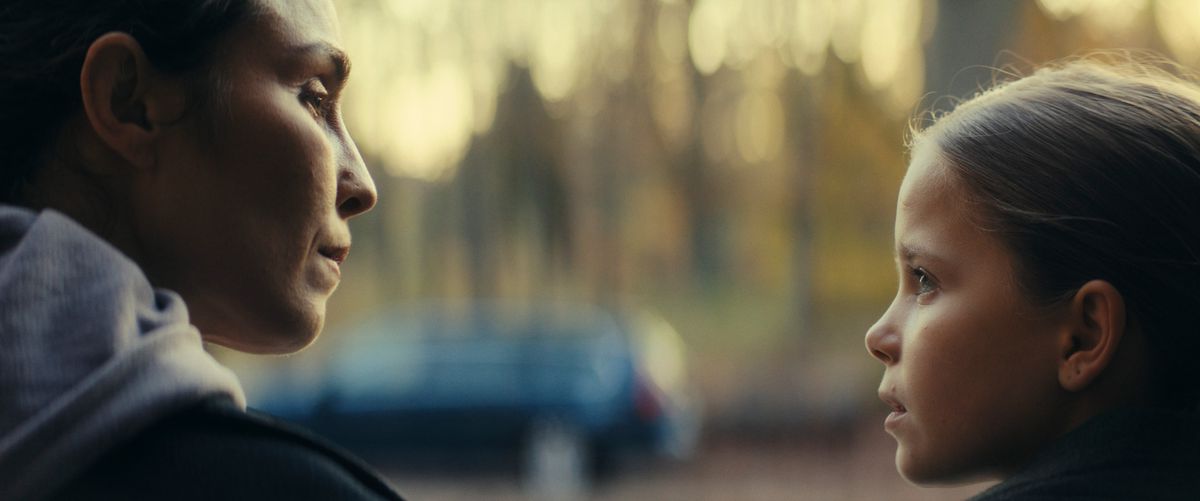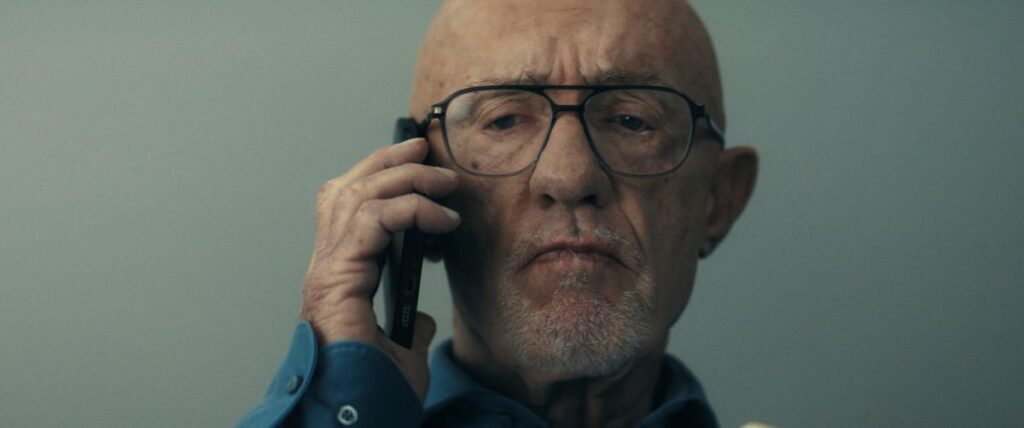Constellation mixes the horrors of space with quantum entanglements on Earth, which is all to say: It gets complicated. After surviving an International Space Station disaster, astronaut Jo Ericsson’s (Noomi Rapace) struggles to comprehend the “hallucinations” bleeding into the faux-normalcy of her domestic world. Which is also to say: It’s a wormhole of complications.
[Ed. note: Spoilers ahead for Constellation.]
As we see in Constellation’s first season, both Jo and her daughter Alice undergo the existential realization that our Jo (the surviving one we spend the majority of time with) swapped realities with Other Jo, Alice’s real mother who was killed aboard the ISS. Like a ghost of this world, Jo is in a state of emotional liminality, feeling disassociated from her new reality and this Alice. Meanwhile, Alice begins to understand that her mother is “there and not there,” both literally and mentally, in child terms. The irony is, the closer that Jo and Alice(s) perceive the liminal boundary between their worlds, the more they are able to move on and survive in their respective worlds.
Having no clear pathway back home (thanks, Bud), Jo bittersweetly resigns to building a life with an unfamiliar Alice and Magnus (James D’Arcy). The bitter part is that she and this Alice understand they must play along with the pretense for some peace, or else incur additional wrath of the meddling space program. The sweet part, at least, is that Jo and this unfamiliar Alice realize they can adopt their own mummy-and-daughter bond, despite being from different places, while Jo’s own Alice takes comfort in her mama being alive somewhere else. Presumably, this new dynamic opens the opportunity for the main Jo and Alice to engage with and love — rather than be confused by — the personality deviations of their loved ones’ alter egos. For Jo to accept a life of “there and not there” is better than “not there” at all.
Still, Jo’s acceptance doesn’t erase the loose threads of her world(s). And there’s a lot that threatens the peace she’s learning to find with Alice.
Can Henry Caldera fix this mess?
Image: Apple TV Plus
Whenever they influence the other’s consciousness, be it willingly or unwittingly, the two Calderas (Jonathan Banks) act as each other’s malicious doppelganger. As we know by the end of the season, Bud was the one who fixed Apollo 18, but the mysterious reality switcheroo saddled him with a discredited reputation while Henry got the fame and a clean(er) conscience.
Once Bud discovers that he can influence the Other Caldera through willpower, Bud is happy to haunt Henry, who unintentionally stole his rightful life, his Nobel Prize, and the universe where his heroism saved Apollo 18. It’s somewhat understandable — though asshole-ish — that when Bud is swapped back into his timeline, he axes down Henry Caldera’s CAL capsule to avoid being swept back to the Other Place (and consequently trapping Jo and William Catlett’s Paul away from their proper timelines).
Tellingly, once he’s back in his dimension, Bud’s impulse is to drink in the high life, smirking that the right Henry will reap the Apollo 18 failures and disgrace Bud has borne for decades. Constellation encourages us to wonder how the twisting of fates shaped these displaced Calderas’ respective attitudes, and whether they’re actually getting their just deserts. How much of Bud’s selfishness is influenced by the injustice of losing his timeline? Did having a cushier timeline make Henry slightly more honorable? Either way, Henry admits responsibility for his CAL enabling the ISS disaster that killed Paul (an Other Paul he does not know). Henry is determined to fix his mistake, but he also inherited the shitshow of Bud’s transgressions and murder charges that would obstruct his efforts. If he can get past the lunatic label, there’s a slim chance that Henry’s endeavor to tell the truth about the CAL could lay the groundwork for this reality’s space program to investigate its own timeline anomalies (like, say, that body coming to life on the ISS). In contrast, Bud has all the space program resources at his disposal but would benefit the most from keeping the secret of the CAL’s chaos.
What happened to Paul?
From what we witness, the series implies the CAL sent Paul, Jo’s fellow astronaut, to his “Other Place,” where the CAL didn’t exist and his mentor Henry Caldera is not a chief technician. Out of paranoia over mysterious space noises, Paul leaves Other Jo’s cadaver floating in the space station (more on that later).
When a confused Paul hunts for answers in the Other Place, his search escalates into a confused Bud Caldera shooting him. Now that Bud and Henry swapped back, we got to see Paul briefly reunited with Henry (at the most awkward of times). As Paul recovers in the hospital, perhaps the most hopeful outcome is that he could reach a detained Henry to understand the CAL calamity — if the space program doesn’t dismiss him as a madman.
What’s happening with Jo’s pregnancy?

Image: Apple TV Plus
To cement her decision to stay, Jo also decides to carry to term a pregnancy conceived with the Other Magnus. Alice asks a good question: “If you’re from there [what Alice knows as the Other Place], where’s the baby going to be from?”
The answer seems to be with the ex-cosmonaut/Roscosmos head Irena Lysenko (Barbara Sukowa) — revealed to be the living counterpart of the dead Russian cosmonaut — who discerns an omen on Jo’s ultrasound. The fetal image is seemingly doubled, pointing to a fetal anomaly and perhaps its nebulous linkage into the Other Place. If the fetus was conceived by two beings of different worlds, would it potentially gestate into an unknown entity that might bridge the worlds?
Is Other Jo alive?
The season’s final cliffhanger cuts back to Other Jo’s corpse floating in the ISS and seemingly coming to life. Is this body a vessel for a nefarious alien entity? (Rapace has been there, done that in Prometheus.) Or is it really Other Jo’s consciousness reawakening?
Other Jo’s moving corpse echoes Irena’s corpse surfacing and speaking in Alice’s dreams. I offer my hypothesis: The souls of the dead are snagged in a liminal presence that allows sway between realities. This adds dark hindsight to the living Irena’s episode 3 rumination: “I am always dreaming of space… endlessly circling the Earth,” indicating her vague awareness of her counterpart’s desiccated corpse orbiting the Earth. No wonder Irena advises Jo to simply be grateful that she’s alive and adapt to her (new) environment.
In Constellation, to glimpse into that liminal Other Place means confronting your loss and death in another universe. To close this season, a majority of characters get to lock the lid of this Pandora’s box to placate the disorder for now. But the growing temporal disorder threatens to shake their realities.

